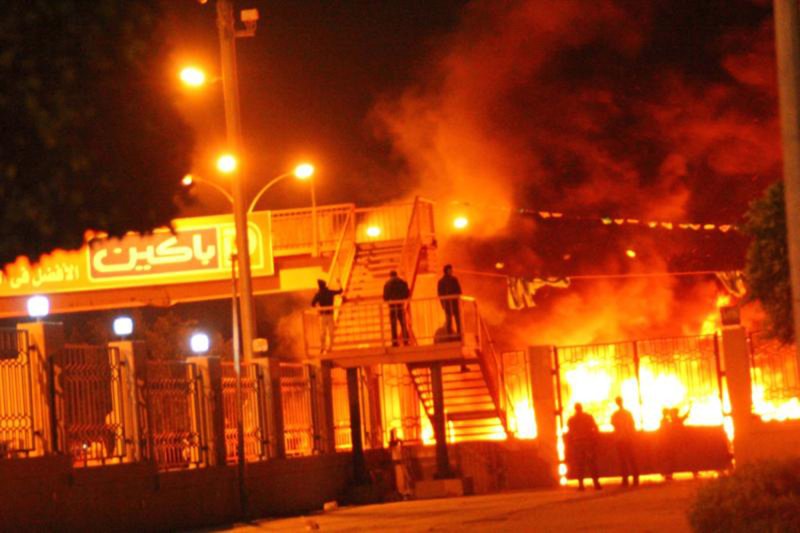The office of the chief of police is burned by anti-regime protesters in Benghazi, Libya, on February 25, 2011. Euphoria in Libya's second city Benghazi gave way to growing concern that it remains vulnerable to a counter-attack by Moammar Gadhafi's forces. UPI |
License Photo
BEIRUT, Lebanon, Feb. 28 (UPI) -- As Moammar Gadhafi battles for survival in Libya's capital Tripoli, many of the henchmen who helped him hold onto power for 41 years remain at his side guarding the darkest secrets of a brutal regime.
These secrets include who was behind the bombings of a Pan Am jumbo jet Dec. 21, 1988, in which 270 people died, the almost identical bombing of a French airliner in 1989 and a 2003 plot to assassinate Crown Prince Abdallah of Saudi Arabia, now king.
Not all of Gadhafi's inner circle has stood by him as the regime came under attack amid a wave of political uprisings across North Africa and the Middle East. One of his closest aides, Justice Minister Mustafa Abdel-Jalil, defected to the swelling rebellion several days ago and claimed Gadhafi had personally ordered the bombing of Pan Am Flight 103 in 1988 over the Scottish town of Lockerbie.
"I have proof that Gadhafi gave the order about Lockerbie," the Swedish newspaper Expressen quoted him as saying in a Feb. 23 report.
That was the first indication from anyone close to Gadhafi that he had been personally involved in the atrocity in which all 259 people aboard the Boeing 747 were killed when it blew up at 31,000 feet over the Scottish town of Lockerbie.
Eleven people on the ground were killed by debris of the jet flying from London to New York.
U.S. and British authorities blamed Libya and demanded Gadhafi turn over two intelligence agents, the main suspects. He refused.
He eventually agreed to do so, reportedly on condition that his regime wasn't held responsible even though U.S. authorities were convinced Gadhafi -- dubbed "the mad dog of the Middle East" by Ronald Reagan -- was at the center of the plot.
Given Gadhafi's tight hold on power, it is unlikely that his notorious intelligence services, which for years waged a global "stray dogs" campaign eliminating his political opponents, would have acted without his approval.
At a special trial in the Netherlands, one of the agents, Abdelbaset al-Megrahi, was convicted in 2001 and sentenced to 27 years in prison. Megrahi, reportedly suffering from terminal cancer, was released Aug. 20, 2009, on compassionate grounds under a murky deal between London and Tripoli. He is reported in poor health but alive in Tripoli.
Megrahi denied any involvement with the bombing. He was widely seen as a fall guy for Gadhafi's regime, then virulently anti-Western and branded a state sponsor of terrorism. After his conviction, Scottish authorities revealed Megrahi had $2.5 million in a Swiss bank account.
Expressen quoted Abdel-Jalil as saying Gadhafi "did everything in his power to get Megrahi back from Scotland.
FBI investigator Richard Marquise, who led the U.S. task force on the Lockerbie bombing, said: "Megrahi never talked. He did everything for his leader."
Another trusted Gadhafi crony is Col. Abdullah al-Senussi, who's married to a sister of Gadhafi's second wife. He's considered one of Gadhafi's "ahl al-Khaimah," or "People of the Tent."
He's head of the Jamahariya Security Organization, which includes the External Security Organization that employed Megrahi. Senussi and another intelligence chief, Musa Kusa, reportedly recruited the bomb plotters.
Senussi was responsible for the slaughter of 1,200 Islamists in Abu Salim prison in 1996. Rebel chiefs say he organized mass killings in Benghazi before it fell to the insurgents last week.
In 1999, a French court sentenced him and five others in absentia to life in prison for bombing a French UTA DC-10 airliner over Niger Sept. 19, 1989, killing all 170 people aboard.
In 2003, Senussi and Kusa allegedly masterminded the plot to assassinate Crown Prince Abdallah, part of a long-smoldering rivalry between Libya and Saudi Arabia.
The plot was discovered after two Libyan participants confessed to Saudi and U.S. officials but like the bombings there's much that remains unknown.
In the 1970s, Kusa was Gadhafi's ambassador in London who masterminded the extermination of the regime's enemies across Europe. Britain expelled him after a policewoman was shot dead outside the Libyan Embassy.
Kusa headed the ESO in 1994-2009, when he was named foreign minister. He was the regime's clandestine link to various intelligence services, including the CIA and Britain's MI6, which Gadhafi wants kept secret.
"Musa's got nowhere to go," a British source said. "He'll stick with Gadhafi to the bitter end."





